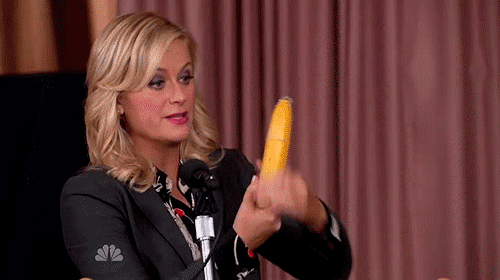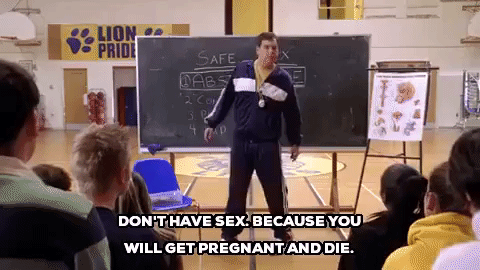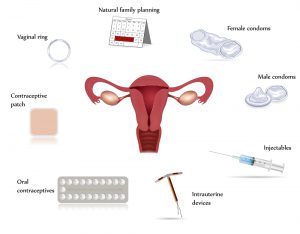Who would have thought you’d need to be taught how to put on a condom in school?
For most Singaporeans, the first time we would ever learn about the birds and the bees are in the sex education talk we get in primary and secondary school. Even so, our young minds were too amused by any mentions of ‘penis’ or ‘vagina’ to pay attention.
Ask any millennial what they remembered from this talk and they will likely tell you that it was ‘some random stranger preaching about abstinence and warning you about the dangers of unsafe sex’.
With not much absorbed from these supposedly very important lessons, it’s a wonder that Singaporean millennials know so much about sex.
Having no distinct memory of ever sitting for a sex education talk myself, I spoke to some of my fellow millennials to see how much they actually remember. They, fortunately were able to enlighten me about the most awkward 60 minutes of secondary school. And after hearing what they had to say, I’m glad I’ve been able to suppress this from my memory.
Though some of what they said did get me wondering, “how did I ever forget this??”
“‘Don’t have sex or you’ll get pregnant and die!’ – something that I took away when they taught us about sexually transmitted diseases (STDs) in secondary 3”
– Aisha, 25
Complementing the messages of preventing STDs were lessons on using condoms for safe sex. Naturally, watching a grown adult roll a condom down a banana stood out for many.
“When learning how to wear a condom properly with the use of a banana as example, they told us, ‘always remember to the pinch the top!’”
– Natasha, 27

It’s great that we have a sex education program in place at all. In countries like China, sex education is almost completely non-existent and experts say that this has contributed to the rise of HIV and abortion cases amongst the Chinese youth.
While I’m grateful that such statistics isn’t that much of a worry in Singapore, many of us still find our sex education program to be pretty sh*t.
SINGAPORE’S ABSTINENCE-ONLY APPROACH
The Ministry of Education (MOE) values abstinence as the best approach in the prevention of STDs and unwanted pregnancies. But this is unrealistic.
Teens are having sex, and it’s silly for anyone to think otherwise. That makes it all the more crucial that teens are provided with necessary information to help them in make informed choices. Instilling fear of STDs and AIDS in them isn’t going to work.
“I remember that a lot of the focus was not really on the process, but on the DANGERS of unsafe sex. Telling teenagers ‘DO NOT HAVE SEX, YOU WILL GET HERPES’ just makes them scared to seek help if they need it.”
– Melissa, 28
The more you tell a teenager not to do something, the more s/he will do it. Rather than trying to prevent the impossible i.e. teenagers having sex, and living with the idealistic mindset that teens will abstain till marriage, schools should address the obvious straight-on. It’s time sex education lessons started giving students answers to questions that they shouldn’t be looking for on Google.

Let’s be honest. We learnt a lot more about sex and protection through the videos and stories we see and read online than through our sex ed. But that isn’t necessarily the best way to go when the resources available online may not always be ‘healthy’.
“It was a lot of out-dated scaremongering and it didn’t maturely teach teenagers how to practice safe sex at a point in their lives where they would be naturally sexually curious, if not already active.”
– Nikki, 25
It is a problem and we need to rethink the way we teach sex education because it is invaluable knowledge that will impact the rest of our lives. Abstinence and encouraging safe sex are good messages, but there are many bigger concerns that teens will come to have when they become sexually active.
LET’S TALK ABOUT CONTRACEPTION
Aside from teaching teens how to put a condom on a banana, our sex education barely touches on birth control and contraception.
“The school was so obsessed with talking about the dangers of sex that they didn’t give us practical advice, like informing us about the various forms of birth control and where to get them.”
– Sophia, 23
As a teenage girl myself once, I knew close to nothing about contraceptives. I had only heard about condoms and learnt about the existence of birth control pills through movies and television. When I reached a stage in my life when I had to use it, I jumped to Google to gather all the information I now know about contraception.
I wish my school would have given me a “Contraceptives 101” crash course (or even a sex education talk worth remembering).
Let’s take the image below for example. It shows us the various methods of contraception. Even looking at it now, I can’t say that I am entirely sure how some of these contraceptives work.
Can I Google it? Sure. But I shouldn’t have to.

In Northern and Western Europe, students learn about contraception as part of their sex education program and where, no surprise, the rate of unintended pregnancies is low.
But not only does learning about contraception prevent unintended pregnancies, it arms teens with the knowledge that will help them be less vulnerable and more prepared in the face of unforeseen circumstances.
For instance, if a teen who hasn’t been taught about emergency contraception ever finds themselves in a vulnerable position after unprotected sex, they’re more likely to feel confused and scared than someone who has learnt about them.
REAL-WORLD SITUATIONS
As parents to a teenage daughter, my parents became extra paranoid about the people I hung out with once I hit puberty. And by people, I mean boys.
The compelling need to protect daughters from danger has been ingrained into people’s minds for centuries. There’s a chronic fear when it comes to raising daughters that no one openly talks about, but we all know it’s there.
Conversations like these are often kept hush-hush. But how can we hope to eliminate a fear without talking about it?
There have been many cases over the past couple of months that have opened up a can of worms over the concept of consent before or during sex.
“If a girl doesn’t say no, does it mean yes?”
“But they’re in a relationship, still need to ask permission meh?”
“The girl knew what she was getting into the moment she started making out with him.”
Be it the Eden Ang controversy, or the RP graduate who got flamed online for her blog post describing an incident that occurred between her and her then-boyfriend, these “discussions” have warranted that we re-evaluate the way we think and talk about sex.
Talking about abstinence doesn’t help when you find yourself in a situation beyond your control. And knowing about the consequences of unsafe sex (STDs) wouldn’t matter when it’s too late to prevent it. Concerns that sex education should also touch on include dealing with undesirable situations. For example, teaching girls and boys about consent.
The United Kingdom has recently reformed its sex education program to include lessons on consent as well.
Being able to ask and clarify before making an advance, saying no to unwanted advances and understanding the verbal and visual cues of consent are all important in creating a safer space for teens not just in schools, but outside school grounds as well.
Talking about the issue with their peers and discussing and clarifying their concerns with educators can help teens understand what a healthy relationship looks like.
“Boys should know to ask for consent and to cope with their sexual urgencies and girls should be empowered to say ‘no’ if they don’t want to have sex.”
– Victoria, 26
Sex needs to be openly discussed. By keeping this conversation confined behind closed classroom doors and separating girls and boys during this talk, we’re only reinforcing the message that sex is “bad” and “wrong”.
If we teach sex education the way we teach students Math, for example, we’ll be creating a safe space where students wouldn’t need to shy away from seeking help if ever they find themselves in a predicament. And if teens today find themselves feeling confused or conflicted like we once did, all they’d need to do, is ask.
While the act of sex may be done behind closed doors, the conversation shouldn’t have to be.
Also read: Let’s Talk About Sex: 15 S’poreans On Whether Sexual Compatibility Is Important In A Relationship
